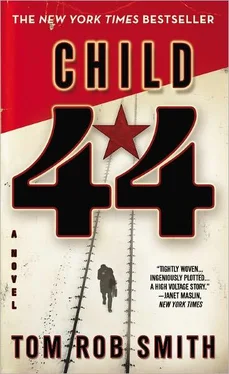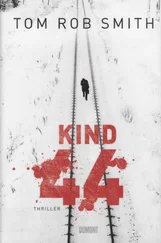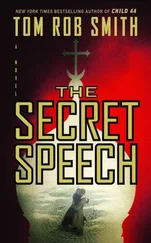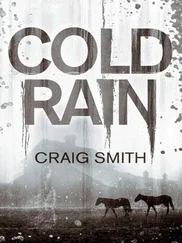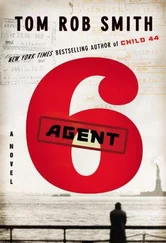He didn’t stop shouting until his throat hurt and his voice disappeared. Whimpering, he wanted to tell his brother that he could have his share of the cat. He just wanted him back. But it was no good. His brother had left him. And he was alone.
Oksana had hidden a small bag of powdered cornstalks, pigweed and crushed potato peelings behind the bricks of her oven. During inspections she always kept a small fire burning. Collectors sent to check that she wasn’t hoarding grain never looked beyond the flames. They mistrusted her — why was she healthy when the others were sick, as though to be alive was a crime. But they couldn’t find food in her house, couldn’t brand her a kulak , a rich peasant. Instead of executing her outright they left her to die. She’d already learnt that she couldn’t beat them by force. Some years ago she had organized the village resistance after it was announced that men were on their way to collect the church bell. They wanted to melt it down. She and four other women had locked themselves in the bell tower, ringing it continuously, refusing to let them take it away. Oksana had shouted out that this bell belonged to God. She might have been shot that day but the man in charge of the collection decided to spare the women. After breaking down the door he’d said that his only orders were to collect the bell, explaining that metal was necessary for their country’s industrial revolution. In response she’d spat on the ground. When the State began taking the villagers’ food, arguing that it belonged to the country and not them, Oksana had learnt her lesson. Instead of strength she feigned obedience, her resistance remaining a secret.
Tonight the family would have a feast. She melted clumps of snow, bringing it to the boil and thickening it with the powdered cornstalks. She added the remaining bones from the bottle. Once cooked, she’d grind the bones down to flour. Of course she was getting ahead of herself. Pavel hadn’t succeeded yet. But she felt sure he would. If God had given her hardship he’d also given her a son to help. All the same, if he didn’t catch the cat she promised not to become angry. The woods were large, a cat was small, and anyway anger was a waste of energy. Even as she tried to brace herself for disappointment she couldn’t help becoming giddy at the prospect of a meat and potato borscht.
Andrei stood in the doorway, his face cut, snow on his jacket, snot and blood running from his nose. His laptys had completely come apart and his toes were visible. Oksana ran over.
— Where’s your brother?
— He left me.
Andrei started to cry. He didn’t know where his brother was. He didn’t understand what had happened. He couldn’t explain. He knew his mother was going to hate him. He knew it was going to be his fault even though he’d done everything right, even though it was his brother who’d left him.
Oksana’s breath was snatched from her. She brushed Andrei aside and hurried out of the house, looking to the woods. There was no sign of Pavel. Maybe he’d fallen and injured himself. Maybe he needed help. She ran back inside, desperate for answers only to see Andrei standing by the borscht with a spoon in his mouth. Caught red-handed, he looked at his mother sheepishly, a line of potato soup dribbling from his lip. Overcome with anger — anger at her dead husband, her missing son — she ran forward, knocking Andrei to the ground and pushing the wooden spoon down his throat.
— When I pull this spoon out of your mouth tell me what happened.
But as soon as she pulled out the spoon all he could do was cough. Enraged, she shoved the spoon back down his throat.
— You useless, clumsy, stupid boy. Where is my son? Where is he?
She pulled the spoon out again but he was crying and choking. He couldn’t talk. He just kept crying and coughing and so she hit him, pounding her hands on his tiny chest. Only when the borscht was in danger of boiling over did she stop. She stood up, moving the soup off the fire.
Andrei whimpered on the floor. Oksana looked down at him, her anger melting away. He was so small. He loved his older brother so much. She bent down, picked him up and sat him on a chair. She wrapped her blanket around him and poured him a bowl of borscht, a generous portion far larger than he’d ever had before. She tried to spoon-feed him but he wouldn’t open his mouth. He didn’t trust her. She offered him the spoon. He stopped crying and began to eat. He finished the borscht. She filled the bowl again. She told him to eat slowly. He ignored her, finishing a second bowl. Very quietly she asked what had happened and listened as he explained the blood in the snow, the dropped sticks, the disappearance and the heavy footprints. She closed her eyes.
— Your brother is dead. He’s been taken for food. Do you understand? Just as you hunted that cat, someone was hunting you. Do you understand?
Andrei remained silent, staring at his mother’s tears. In truth, he didn’t understand. He watched at she stood up and left the house. Hearing his mother’s voice, he ran to the door.
Oksana was on her knees in the snow, staring up at the full moon.
— Please, God, give me back my son.
Only God could bring him home now. It wasn’t so much to ask. Did God have such a short memory? She’d risked her life to save his bell. All she wanted in return was her son, her reason to live.
Some of the neighbours appeared at their doors. They stared at Oksana. They listened to her cries. But there was nothing unusual about this kind of grief and people did not watch for long.
11 February 1953
The snowball thumped into the back of Jora’s head. Caught by surprise, snow exploded around his ears. Somewhere behind him he could hear his little brother laughing, laughing really loudly — proud of himself, proud of that shot even though it was a fluke, a one-off. Jora brushed the ice off his jacket collar but fragments had already snuck down his back. They were melting, sliding down his skin, leaving snail-trails of freezing water. He tugged his shirt out of his trousers, reaching his hand up as far as he could, scraping at the ice.
Unable to believe his older brother’s complacency — busy with his shirt instead of checking on his opponent — Arkady took his time, clumping together the snow, handful on top of handful. Too large and the snowball became a dud shot: difficult to throw, slow in the air and easy to dodge. That had been his mistake for a long time, making them too big. Instead of having a greater impact they could be swatted out of the air and more often than not they disintegrated of their own accord, falling apart and not even reaching his brother. He and Jora played in the snow a lot. Sometimes there were other children but most of the time it was just the two of them. The games would start casually, growing more and more competitive with each hit. Arkady never won in so far as anyone could be said to win. He was always overwhelmed by the speed and power of his brother’s throws. The games ended the same way: frustration, surrender, getting annoyed, or worse, crying and storming off. He hated that he was always the loser, and worse, he hated that he got so upset about it. The only reason he kept playing was because he was sure that today would be different, today he’d win. And today was that day. Here was his chance. He edged closer but not too close: he wanted the shot to count. Point-blank didn’t count.
Jora saw it coming: a glob of white arcing through the air, not too big, not too small, just like the kind he’d throw. There was nothing he could do. His hands were behind his back. He had to admit his little brother was learning fast.
Читать дальше
